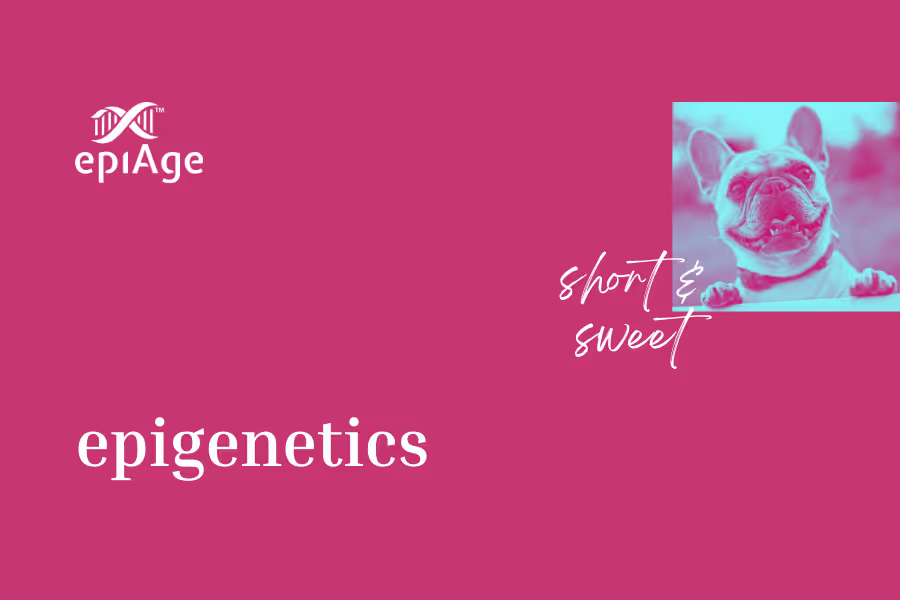Missed “short & sweet” instalment no. 5 on “healthspan”? Catch up here!
Genetics? If you grew up in the 1950s or 60s, chances are you were either unfamiliar with the term or it still had a distinct sci-fi vibe… Kids today are not only familiar with it, but they might even be able to associate genetics with expressions such as DNA, code or XX versus XY.
But epigenetics?
For most people (and not just children…), it remains a bit of a mystery, even if you see it increasingly mentioned in the “Science” section of your favourite daily. Why is that? Because the discipline is highly complex and still fairly young, reflecting the rapid technological and analytical innovations in the field.
So, let’s get back to basics and first define “genetics”, since you can’t understand “epigenetics” if “genetics” is still a bit fuzzy. At epiAge, we like to keep it simple (short & sweet, remember?) hence we quite like the Wikipedia definition:
“Genetics is the study of genes, genetic variation, and heredity in organisms.”
In other words, genetics focuses on the biochemical information or blueprints that shape or constitute living beings and that are passed on. These blueprints are relatively stable (hardware) but are constantly subject to micro-changes or so-called mutations, especially when cells divide (mitosis).
This definition is mirrored in the Greek origin of the word “genetics”: genetikos (γενετικός: genitive or generative) or genesis (γένεσις: origin). So, our genes are linked to our origin, and they are a form of legacy. And just like a material object inherited from your parents, they remain relatively sturdy, even if the passage of time and the environment may influence their structure and/or their appearance over the long run.
The prefix “epi-” also stems from Greek (ἐπι) and means “over”, “outside of”, “around” or “about”. So, etymologically speaking, you could say that epigenetics is the science of “beyond origin”. It points to a layer of activity around or outside the genes.
And that is what epigenetics is all about. It is the branch of biology that focuses on the system of biochemical switches (e.g. methylation, histone modification, etc.) that activate or silence particular gene sequences, without modifying them.
And this activation or silencing is steered by a web of inner and outer environmental factors determining and surrounding living beings.
In the case of human beings, one can distinguish at least four meta-layers of environment:
· the genetic environment (yes,there is an interaction between the two layers!)
· the bio-psycho-social environment (upbringing, life history/personal experiences, behaviour, illnesses, exercise and sleep patterns, stress regulation, etc.).
· the socio-economic environment (including factors such as poverty/affluence, housing, diet, education, vocational choices, etc.)
· and the physical or geographical environment and its various properties (e.g. climate, toxins, pathogens, etc.),
Hence, while genetics primarily focuses on the fixed traits or the hardware of an individual such as their height, eye colour or blood type, epigenetics investigates (potentially) more fickle or fleeting characteristics that you could describe as software. Some epigenetic characteristics are nevertheless transmitted to the next generations, such as e.g. the protection against or the propensity towards certain diseases or the effects of chronic stress and trauma.
The implications of the distinction between genetics and epigenetics, i.e. between (relatively) fixed traits and (potentially) temporary or reversible characteristics, are enormous. Indeed, while genes evolve extremely slowly over time and individuals have little, if any, conscious effect on them, individuals can certainly influence their epigenetics through environmental changes.
For example, you can decide to reduce the toxic load of your immediate environment by modifying your diet to include more natural foods or by switching to milder cleaning and grooming products. And this will have an epigenetic influence!
So, in a nutshell, epigenetics has a huge impact on how your genes express (or not). And, to a large extent, you have the remote-control in your hands since epigenetic characteristics are potentially reversible!
Curious about what that implies more concretely? Read our next “short and sweet” post no. 7 on “biological age” …
++++
Sources and further reading
“Genetics”. Wikipedia. Online: https://en.wikipedia.org/wiki/Genetics
Zhang, Sarah, “Your Body Acquires Trillions of New Mutations Every Day. And it’s somehow fine?”. The Atlantic. May 7, 2018. Online: https://www.theatlantic.com/science/archive/2018/05/your-body-acquires-trillions-of-new-mutations-every-day/559472/
“What is epigenetics?”. Medline Plus. NIH National Library of Medicine. Online: https://medlineplus.gov/genetics/understanding/howgeneswork/epigenome/
„Epigenetics“. Encyclopedia Britannica. Online: https://www.britannica.com/science/epigenetics
Epigenetics, Health, and Disease. CDC [Center for Disease Control]. Online: https://www.cdc.gov/genomics-and-health/epigenetics/index.html
“Epigenetics and Child Development: How Children’s Experiences Affect Their Genes”. Center on the Developing Child. Harvard University. Online: https://developingchild.harvard.edu/resources/what-is-epigenetics-and-how-does-it-relate-to-child-development/
Baduel, P., Sammarco, I., Barrett, R., Coronado-Zamora, M., Crespel, A., Díez-Rodríguez, B., Fox, J., Galanti, D., González, J., Jueterbock, A., Wootton, E., & Harney, E. (2024). The evolutionary consequences of interactions between the epigenome, the genome and the environment. Evolutionary Applications,17, e13730. https://doi.org/10.1111/eva.13730. Online: https://onlinelibrary.wiley.com/doi/full/10.1111/eva.13730
„Epigenetics“. Wikipedia. Online: https://en.wikipedia.org/wiki/Epigenetics
“Transgenerational epigenetic inheritance”. Wikipedia. Online: https://en.wikipedia.org/wiki/Transgenerational_epigenetic_inheritance
Illustration
pixabay & epiAge
 Back to all posts
Back to all posts